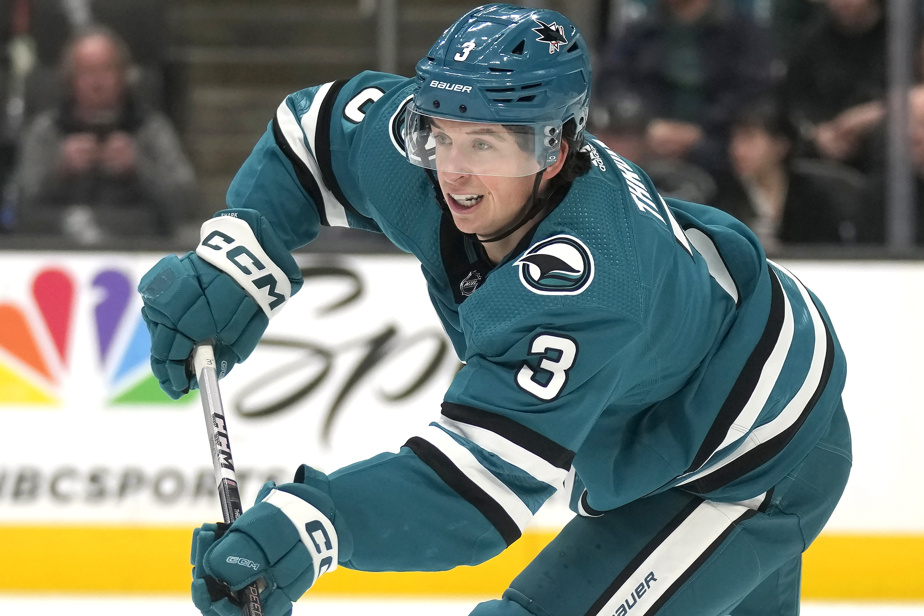Cutter Gauthier is not the only NCAA player to have used his negotiating power to gain some control over his NHL destination.
Thursday evening, at the Bell Centre, we will see Henry Thrun, a Sharks defenseman who also preferred to look elsewhere, in action. Except that the story did not have the same impact, on the one hand because he did it in a more conventional way, on the other hand because he did not leave school with the status a 5th overall pick, with all respect.
“Once I realized there were better places for me, the right thing to do was let the Ducks know and not leave them in the dark. I respected the people there a lot,” Thrun explained to La Presse on Thursday morning at Sharks training.
Thrun was a 4th round pick, 101st overall, in 2019. Sure enough, he was drafted by the Ducks, the team that finds itself with Gauthier today.
Once drafted, Thrun played for Harvard University. The problem is that during this time, Anaheim cleaned up, notably dismissing general manager Bob Murray.
The other problem: The Ducks started stacking defensemen in the draft. In the next three auctions, they claimed seven in the first three rounds, including two in the top 10: Jamie Drysdale (we told you, everything is in everything) and Pavel Mintyukov. Last season, the defensemen of the year in the three Canadian junior circuits belonged to Anaheim: Mintyukov in Ontario, Olen Zellweger in the West and Tristan Luneau in the QMJHL.
Thrun refuses to attribute his decision solely to the Ducks’ rich succession on defense. “I remain confident in my abilities. But the GM and staff who drafted me were no longer there, so my status was becoming more fluid,” he recalled.
At the same time, the Sharks were beginning a rebuilding process, led by two guys from the Boston area, where he comes from: general manager Mike Grier and head coach David Quinn. “I had a certain level of comfort with them,” he explains.
It was on February 15 that sister Lisa Dillman revealed that Thrun did not intend to reach an agreement with the Ducks at the end of his university season. The team then had the option of trading him before losing their rights to the player.
On social networks, fans began to make connections with Montreal, in particular because he had just spent his university internship with Sean Farrell, a CH hopeful.
“I know Sean, but also Jordan [Harris], Jayden [Struble] and Cole [Caufield]. I’m familiar with a lot of people, and Kent Hughes too, I often ran into him in the arenas in Massachusetts because I’m almost the same age as one of his sons. So I have a lot of ties to Montreal! But I’m happy in San José. »
As a left-handed defender, Thrun could also have seen some congestion in the Montreal organizational chart, with Harris and Struble, as well as Kaiden Guhle, Arber Xhekaj and Lane Hutson among the youngsters.
On February 28, the Ducks finally traded Thrun to the Sharks for a 2024 3rd round pick, and the young man was able to begin his NHL career last spring after Harvard was eliminated in the NCAA.
“I only really thought about my future in the second half of the season,” assures Thrun. Once I realized that one way or the other I had to make a decision, I did my homework. My advisors also reminded me that I had to make up my mind, in order to inform the Ducks if I preferred to go elsewhere. I think I gave them enough time to react and I had enough time to think about it. »
If his goal was to quickly reach the NHL, he was right. On Thursday night, he will play his 25th NHL game. His statistics are very modest, nothing surprising knowing that he plays within a team on the verge of establishing modern records of mediocrity. In 16 games, Thrun has three points and is -9, with 18 minutes per game.
Along with William Eklund, however, he is one of the rare members of the current edition of the Sharks to be part of the team’s longer-term plans.
David Quinn, for his part, says he is very happy to count on one more hope. “It’s hard to develop in the NHL,” recalled the Sharks head coach Thursday morning. Not every player can handle that, but he can. He is easy to lead and doesn’t let his problems get in the way of his development. »
Quinn benefits from the leverage of college players for the second time in his NHL career. When he managed the Rangers, he welcomed Adam Fox, another Harvard defenseman, who first refused to join the Flames, then the Hurricanes.
Previously, Quinn also experienced the other side of this reality as head coach at Boston University.
“I always believed that a young person should remain loyal to the organization that drafted him,” said Quinn. But the influence of advisors [editor’s note: term used to talk about agents in the NCAA] is one thing, and organizations sometimes undergo their own changes. Each case is different, you don’t have just one model. There are a few exceptions here and there, but 95% of players end up with the organization that drafted them. »
